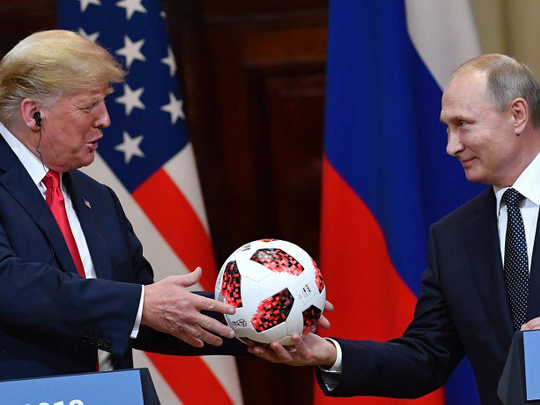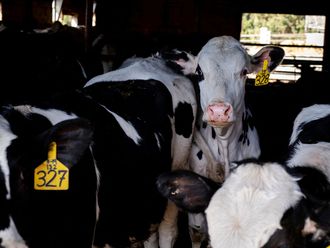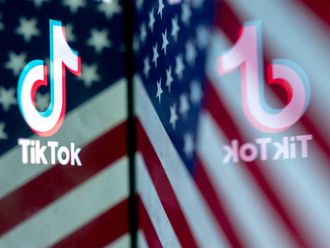
It was the first thing that CNN viewers heard as the news conference ended, an assessment both acidic and incisive, the sort of judgment not usually uttered by Very Important Television Anchors.
"You have been watching," said the disembodied voice of Anderson Cooper, "one of the most disgraceful performances by an American president at a summit in front of a Russian leader that I've ever seen."
Perhaps Cooper had briefly forgotten the mores of his profession - stolidity and a Cronkite-ian cool - in the heat of a surreal live event: a public pas de deux on Monday between President Donald Trump and President Vladimir Putin of Russia, in which the president criticized US intelligence agencies and declined multiple opportunities to blame Putin for interfering in US elections.
But Cooper's remark, though pointed, was not far removed from the nonplused reactions of his fellow network stars, who seemed to channel a level of genuine shock rare even in the chaotic Trump era.
"All of you who are watching today will be able to tell your friends, family, your children, your grandchildren, you were watching a moment of history," said George Stephanopoulos of ABC News, adding: "It may not be for the right reasons."
"They were almost chummy, as if they were allies," said a dumbfounded Norah O'Donnell of CBS News. "The way they talked about one another and how they wanted to move forward together in the future."
CNN's David Gergen, the veteran presidential adviser, said it was "a struggle to put it all together," concluding, finally: "I've never heard an American president talk that way."
Even the reliably pro-Trump Drudge Report issued a harsh verdict. "Putin Dominates," the site's lead all-caps headline read.
On Fox News, home of presidential cheerleaders like Sean Hannity and the hosts of "Fox & Friends," the response from the network hosts and commentators was mixed, a tweak from the typical coverage that critics deride as "state TV."
Abby Huntsman, a co-host of "Fox & Friends Weekend" - and a daughter of Jon M. Huntsman Jr., Trump's ambassador to Russia - tweeted scathingly about the president, writing, "No negotiation is worth throwing your own people and country under the bus."
A daytime news anchor, Bill Hemmer, kicked off the postgame show by calling the event "fascinating" - Lester Holt of NBC News used the same descriptor - and went on to give a nuts-and-bolts summary of the highlights. Bret Baier, the network's chief political anchor, called it "quite something - almost surreal at points."
But Daniel Hoffman, a former CIA station chief and Fox News contributor, was unsparing when he attacked a Putin proposal that Trump had embraced: that Russia might cooperate with the United States in investigating breaches of its election security.
"From my perspective as an intelligence officer, it's like inviting a criminal to help you solve a crime you know that they committed," Hoffman said. His interlocutor, Hemmer, seemed taken aback. "So you don't believe in that," he said, after an awkward pause.
Later, Mary Kissel, a Wall Street Journal editorial board member, took issue with Fox News anchor Sandra Smith's optimistic account of the news conference, asking, "Where is the evidence that we can trust Putin to follow through on what he says?"
John Roberts, the network's chief White House correspondent, weighing in from Helsinki, made reference to the special counsel, Robert S. Mueller III, when he offered a different view of why the United States may not cooperate with Russia on any investigation of US election security: "There are some people who might say it's because Mueller doesn't want to know the truth," Roberts said.
Journalists remained the target of Trump on Monday - standing beside Putin, he lumped "the media" in with Democrats and "partisan critics" as obstructionists - but the most revealing exchanges at the summit meeting were prompted by questions from the US news media.
The questioners selected by the White House - Jeff Mason of Reuters and Jonathan Lemire of The Associated Press - worked to get answers from Trump and Putin on the most significant topics surrounding the meeting: the charges by US intelligence agencies that Russia meddled in the 2016 presidential race and whether Trump believed Putin's claim of innocence. In a follow-up, Lemire asked Putin if he had compromising material on Trump.
"It's hard to imagine greater nonsense," the Russian president replied, staring at the reporter. "Please get this rubbish out of your heads."
Putin was similarly piqued when he sat for an interview afterward with Chris Wallace of Fox News, who jousted with the Russian president over hacking allegations and why many of his political opponents end up, as Wallace put it, "dead or close to it."
In full deflection mode, Putin denied that his nation interfered with US elections - "Do you really believe that someone acting from the Russian territory could have influenced the United States and influenced the choice of millions?" - and said he had no compromising material on Trump.
Before the 2016 race, "he was of no interest for us," Putin said of the president. "There's plenty of rich persons in the United States," he added. "He was in the construction business. He organized the beauty pageants."
"No," Putin added. "It would never occur to anyone that he would think of running for president."












